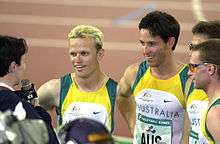Stephen Wilson (athlete)
Stephen Raymond Wilson, OAM[1] (born 28 December 1971)[2] is an Australian Paralympic athlete.
| Personal information | ||||||||||||||||||||||||||||||||||||||
|---|---|---|---|---|---|---|---|---|---|---|---|---|---|---|---|---|---|---|---|---|---|---|---|---|---|---|---|---|---|---|---|---|---|---|---|---|---|---|
| Full name | Stephen Raymond Wilson | |||||||||||||||||||||||||||||||||||||
| Nationality | ||||||||||||||||||||||||||||||||||||||
| Born | 28 December 1971 (age 48) | |||||||||||||||||||||||||||||||||||||
Medal record
| ||||||||||||||||||||||||||||||||||||||
Personal
Wilson was born in Sydney on 28 December 1971.[3] In 1986, while he was a student at Newington College (1984–1987),[4] Wilson was hit by a truck and doctors were forced to amputate his right leg just below the knee.[5] He is married and has five children. He was a physical education teacher, and is currently the principal of Dalby Christian School.[2]
Competitive career

Wilson took up competitive running in 1997; in that year he competed at his first national competition and received the Developing Paralympian of the Year Award.[2] At the 2000 Sydney Paralympics, he won two gold medals in the Men's 4x100 m Relay T46 and Men's 4x400 m Relay T46 events,[6] for which he received a Medal of the Order of Australia.[1] In 2000, his competitive sport participation was sponsored by the Motor Accidents Authority in New South Wales.[7] At the 2004 Athens Paralympics, he won a silver medal in the Men's 4x400 m T42–46 event and a bronze medal in the Men's 4x100 m T42–46 event.[6] At the 2008 Beijing Paralympics, he won a bronze medal in the Men's 4x100 m T42–46 event.[6] He has retired from competitive athletics.[2]
References
- "Wilson, Stephen Raymond". It's an Honour. Archived from the original on 13 February 2015. Retrieved 25 January 2012.
- "Stephen Wilson". Australian Paralympic Committee. Archived from the original on 9 May 2012. Retrieved 9 May 2012.
- "Athlete's Profile". Australian Paralympic Committee. Archived from the original on 4 December 2000. Retrieved 9 May 2012.
- Newington College Register of Past Students 1863–1998 (Syd, 1999) pp 779
- Wilson, Chris (6 July 2008). "Our blades have no place at Olympics". The Sunday Telegraph. Archived from the original on 17 September 2008. Retrieved 17 August 2008.
- "Athlete Search Results". International Paralympic Committee. Archived from the original on 4 March 2016. Retrieved 9 May 2012.
- "Sydney 2000 Paralympic Games Success". Parliament of New South Wales. 1 November 2000. Archived from the original on 22 May 2014. Retrieved 12 November 2011.
External links
- Stephen Wilson at Australian Athletics Historical Results
- Stephen Wilson at the International Paralympic Committee